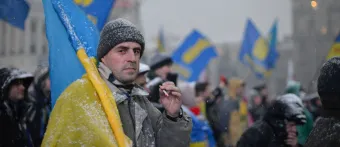History Politicised: Russia, Ukraine and the West

History Politicised: Russia, Ukraine and the West
The media, politicians as well as some international relations experts, have named this conflict a ‘new Cold War’
The conflict in Ukraine is, firstly, one between Ukraine and some of its inhabitants, and with Russia.1 Other European States, the United States and a few other countries are directly involved as well, to an extent unprecedented in the other cases of post-Soviet ‘frozen conflicts’. This is why Russian-Western tensions have markedly increased. The media, politicians as well as some international relations experts, have named this conflict a ‘new Cold War’. At first, in the West, the conflict, its origins and development, were subject to open discussion and contrasted views.
The Russian government and the media, which they tightly control, have also used Cold War rhetoric. However, the Russian side interpreted the events in a more uniform way than in the West. Close examination of the events distinguishes this conflict and confrontation as far less intense and dangerous than the actual Cold War. Developments in other regions, especially in the Middle East, have captured the priorities of policy-makers, while ‘Ukraine fatigue’ now leads them to seek a hasty conclusion.
Key points
- Conflicting history and its perceptions are key factors in the origins of the Russo-Ukrainian conflict and in the consequent Russo-Western tensions, as well as key drivers of their evolution.
- Russia has more effectively ‘weaponised’ both information and history to support its case, and to support the arguments of efficient and influential opinion relays in the West, who argue for a resolution of the crisis that satisfies Russia’s terms, in effect freezing the conflict.
- Allowing a frozen conflict to persist in Ukraine endangers regional security and allows for its reignition, therefore there must be effective narrative and historical counter-arguments to support Western negotiations that will lead to a more balanced and definitive settlement of the crisis.
- The current Russo-Ukrainian conflict also involves neighbouring countries belonging to the European Union (EU) and to the North Atlantic Treaty Organisation (NATO). The crisis is perceived as the most serious crisis in both European affairs and East-West relations in general since the end of the Cold War.
Dr Paul Vallet is an Associate Fellow of the GCSP’s Global Fellowship Initiative.
